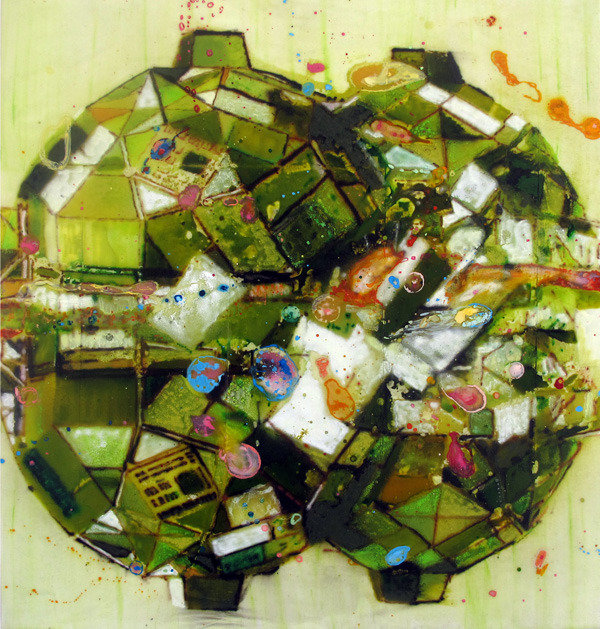Arnold Helbling
dal 18/5/2012 al 22/6/2012
Segnalato da
18/5/2012
Arnold Helbling
C&H art space, Amsterdam
Drop City. In these new works, the apocalyptic storm has passed, and temporary shelters have been put up-an architecture of cohabitation in a post-consumer society has been negotiated.

In a departure from his signature style paintings of deconstructed apocalyptic spaces, in which abstract forms and recognizable images collide in a vast, ecstatically colorful, almost hallucinatory environment, Arnold Helbling’s most recent paintings move into more calm, contemplative territory. In these new works, the apocalyptic storm has passed, and temporary shelters have been put up – an architecture of cohabitation in a post-consumer society has been negotiated. Isolated cell-like structures - a tree-house, a shed haphazardly put together out of recycled windows, makeshift igloos, a leftover utility structure on top of an otherwise demolished office tower – take center stage. However, these temporary structures and alternative forms of living themselves face decay, challenged by interference from nature, from reality, as if these dreams of personal escape or collective utopia are bound to collapse. The individual struggle is everywhere present in these paintings, but the human being is absent: instead, the viewer is invited to take on the role of the main protagonist, the dweller, contemplating the various scenarios.
The title of the show, DROP CITY, is borrowed from a countercultural community that existed for a few years in Colorado in the 1960s. The several dome houses its residents built out of cut-out roofs of cars were inspired by R. Buckminster Fuller’s geodesic dome structure, designed for the American Pavilion at the World Expo in Montreal in 1967.
Helbling’s new paintings were executed through an elaborate monotype transfer process in which entire skins of acrylic paint have been transferred to canvas, creating a luminous, fragile-looking paint film with a unique silken surface. Upon close inspection, this surface reveals a network of subtle and independent veins and marks, which were created by the creases and folds of the plastic sheet used to facilitate this transfer process. Helbling’s color palette ranges from bloody reds to decadent browns, haunting blues, and sappy greens.
Arnold Helbling was born in Switzerland and currently lives and works in New York City. He has exhibited widely in the United States, Europe, and Asia throughout the last two decades.
Image: 'Drop city', 2012, Acrylic on canvas, 87 x 82 cm
Opening: May 19, 2012, 15:00 to 19:00 hrs
C&H art space
Tweede Kostverlorenkade 50, 1053 SB Amsterdam, The Netherlands
Gallery hours: Thu-Sat 11-18 and by appointment



